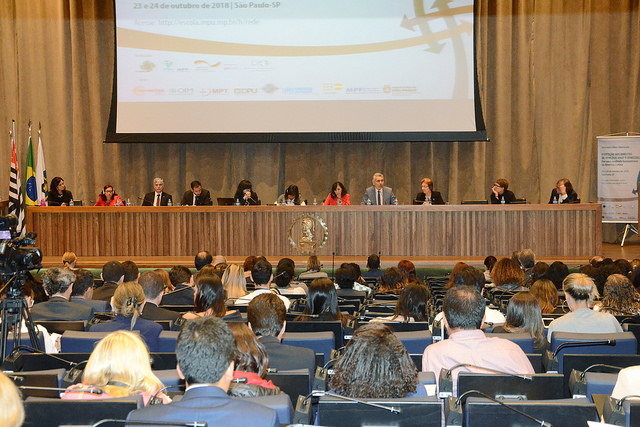Training workshops for over 300 people on subjects regarding migration held in Sao Paulo
In total more than a thousand people were trained in Belém, Manaus and Sao Paulo.

More than 300 people underwent training in subjects related to migration through the project “Working within networks: training for those involved in reception, integration and interiorisation of refugees and migrants in Brazil”. Sixteen workshops were held in total, between 25 and 27 October, in São Paulo. Subjects covered included the Migration Law, fighting xenophobia, cross-cultural relations and integration.
This was the third edition of the project, which had previously been held in Belém (Para) and Manaus (Amazonia) in July and September, respectively. More than a thousand people were trained in the three cities, among them students, participants in civil society, civil servants, representatives from NGOs and journalists.
The workshops were held after the Iberoamerican Seminar “Protecting the rights of Venezuelans – in favour of humanitarian reception in Latin America,” also in São Paulo, on 23 and 24 October. The meeting brought together representatives of Ombudsman’s Offices from nine countries (Colombia, Chile, Ecuador, Spain, Bolivia, Argentina, Peru, Mexico and Brazil) and from national and civil society organisations.
Read more
Conectas brought in the Journalist, Luz Mely Reyes, Editor at Efecto Cocuyo for the panel “The role of the media in fighting xenophobia”. The debate was mediated by the Conectas Programme Coordinator, Camila Asano. A workshop on media training was held on Friday, 26 October for spokespeople in organisations working in the area of migration. The training session was led by the Conectas Communications Coordinator, Leonardo Medeiros. Both events were supported by the Canadian Embassy in Brazil.
The project “Working within networks: training for those involved in reception, integration and interiorisation of refugees and migrants in Brazil” was designed by The Training Network for Refugees and Migrants. This network is made up of ESMPU, the Federal Prosecutor for Citizens’ Rights, The Ministry for Labour, The United Nations High Commissioner for Refugees (UNHCR), the International Organisation for Migration (IOM), Conectas Human Rights, The Institute for Migration and Human Rights, the Brazilian Public Defender’s Office, The United Nations Population Fund (UNFPA) and the United Nations International Children’s’ Emergency Fund (UNICEF).






